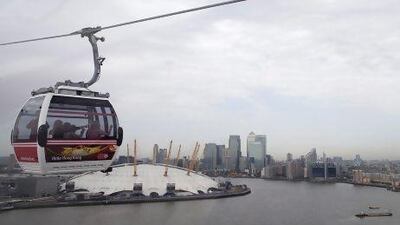LONDON // It towers 90 metres high, then extends out over the river that divides Britain's capital into north and south, affording a dramatic view of London even on a grey and cloudy day.
But the Thames-crossing Emirates Air Line, the cable car that cost £60 million (Dh330m) to build and secured its Dubai-based sponsor a first corporate presence on London's famous underground map, is finding the going tough eight months after its June opening, shortly before the 2012 Summer Olympic Games brought it hundreds of thousands of visitors.
Built to link two developing parts of London, critics say the cable car, which makes a 1,150-metre journey, is a loss-making tourist attraction that offers little as a transport link. And they were quick to pounce when passenger numbers for January and February hit new lows, suggesting the 10-minute ride that connects the Greenwich Peninsula with the Royal Docks north of the river in East London, was running at a loss of up to £50,000 a week.
It is more expensive than normal transport - £4.30 for a ride - but not as high as tourist attractions such as the London Eye.
John Biggs, a Labour Party London Assembly member for the City and East London and a critic of the mayor of London, Boris Johnson, called it a "white elephant" last week.
The mayor, a Conservative, gave the project his blessing and continues to be a staunch supporter.
"Theme park whimsy," wrote a Guardian columnist, Owen Hatherley, in a scathing piece last week that suggested the cable car was evidence Mr Johnson has run London as a "twee austerity nostalgia theme park, with almost ostentatiously negligent attention to the city's problems".
Partly, the criticism centres on promises from Mr Johnson that the project would pay for itself. Transport for London (TfL), London's transport authority, secured a £36m sponsorship deal with Emirates Airline, as well as an £8m development grant from the EU.
Yet building costs ran over budget, and low passenger numbers bode ill for the river link's ability to operate at a profit sufficient to pay down the initial public expenditure.
Mr Johnson continues to defend the cable car. The line was "doing brilliantly" he said last month, and compared it with other transport links that at first met with an indifferent reception but later flourished.
He cited two additions to the Tube network - the Jubilee Line extension and the Docklands Light Railway - as success stories, despite critics saying the lines "would be empty".
TfL, meanwhile, denied reports that the Emirates Air Line is operating at a loss.
Linda Egan, a TfL spokeswoman, said the line had already surpassed passenger projections. Critics are singling out "one bad week", Ms Egan said, referring to the week ending on January 26.
"The estimated passenger numbers for the financial year to March is 1.3 million and we are actually already at 1.8 million.
"It's not operating at a loss, it's operating at a profit."
Mr Biggs said he found that hard to believe.
"The [passenger] numbers were very inflated during the Olympics. The numbers [now] may be higher than in the worst week, but they are still not high enough to cover running costs, let alone pay the debt incurred in building it."
Critics also point out that while the cable car does link two parts of London that are beginning to see some much-needed development, there are existing alternatives to that link and the cable car does not directly connect to the London Underground or train lines. .
"It is a lovely tourist attraction," Mr Biggs said. "But it is not a serious transport option … it runs from nowhere to nowhere."
That was also the verdict last week of Joanie Peters, 44, a nurse who was on a day out with colleagues and residents of the care home in West London where she works.
"I suppose there are people who live here, but there's no real reason to take it apart from the lovely view," she said after a trip on the cable car.
Ibro Muhammad, a 38-year-old Bosnian who has lived in London since the mid-1990s, was taking his first trip on the cable car. The TV producer was heading for the broadcast and production technology exhibition at the Royal Dock's ExCel, part of the Abu Dhabi National Exhibitions Company and Europe's largest expo centre.
The link, he said, was not only "quite spectacular" it was also "very convenient" for the ExCel, even if he could not imagine taking it for any other reason.
The ExCel and the O2, Europe's largest entertainment venue, which is on the Greenwich side, are both cited by supporters as a reason people are taking the cable-car link now. But they concede it may eventually make its mark."Give it time," said Mr Johnson, when asked last month about the disappointing passenger figures.
Ms Egan said the Emirates Air Line was part of a larger regeneration project, one that would bring development and jobs to both sides of the river. And even critics temper their criticism with the hope the cable car holds out for the two areas.

